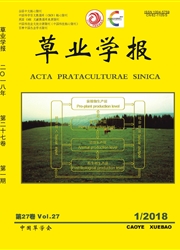

 中文摘要:
中文摘要:
通过实验检验了克隆植物结缕草在异质生境条件下的生理整合作用。结缕草被栽植于4种类型的“生境”内(它们的总体土壤氮索资源水平呈现梯度变化),并同时对匍匐茎的节间实施连接与切断2种处理。实验结果表明,呈连接状态的结缕草克隆的平均复合节数量、平均匍匐茎长度和生物量在各个生境类型间并未表现出明显的差异。但主匍匐茎实施切断处理后的结缕草克隆的上述各项指标均显著减小。生长于贫瘠土壤斑块上的复合节平均根系生物量和根/茎比均高于肥沃土壤斑块。这一特征与其它典型的克隆植物明显不同。结缕草克隆在保持连接的情况下,土壤氮索对节间长度和比节间长度的伸长生长以及分蘖的形成具有促进作用。实验过程中的节问切断处理抑制了节问的进一步伸长但提高了比节间长度。保持结缕草克隆整合并尽量避免严重干扰显得十分重要,特别是在结缕草早期生长阶段。
 英文摘要:
英文摘要:
An experimental study was conducted to examine the effects of physiological integration of Zoysia japonica clones in heterogeneous soil environments. Z. japonica clones which had undergone interconnect;on and disconnection treatments grew in four types of habitats whose overall soil nitrogen levels showed a gradient. The results showed that the average multiple-nodes number, average stolon lengths, and biomasses of Zoysia clones did not show a gradient in the intact treatments. Internode disconnection decreased these indices significantly. Average root biomasses in tubes of infertile soil were consistently greater than those in tubes of fertile soil and root/shoot ratios showed the same trends, which revealed a difference from other typical clonal plant species. In intact treatments, soil nitrogen promoted internode elongation, specific internode length, and also the formation of tillers. Internode disconnection greatly decreased further internode elongation but increased specific internode length. Maintaining clonal integration and avoiding serious disturbance seem to be important, especially in the earlier growth stages.
 同期刊论文项目
同期刊论文项目
 同项目期刊论文
同项目期刊论文
 期刊信息
期刊信息
